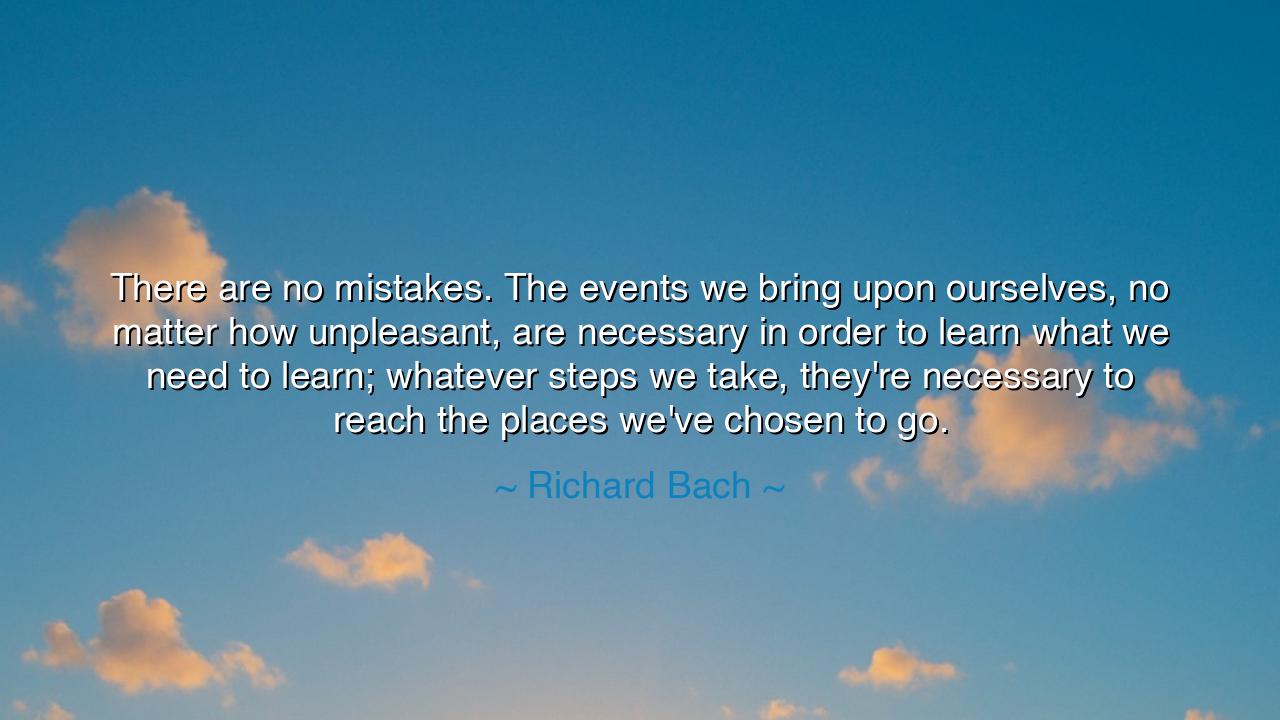
There are no mistakes. The events we bring upon ourselves, no
There are no mistakes. The events we bring upon ourselves, no matter how unpleasant, are necessary in order to learn what we need to learn; whatever steps we take, they're necessary to reach the places we've chosen to go.






“There are no mistakes. The events we bring upon ourselves, no matter how unpleasant, are necessary in order to learn what we need to learn; whatever steps we take, they're necessary to reach the places we've chosen to go.” — Thus spoke Richard Bach, the author of Jonathan Livingston Seagull, a writer whose words soar between earth and heaven, teaching that life’s challenges are not punishments, but pathways. In these lines lies a wisdom both tender and fierce — a reminder that every trial, every failure, every sorrow that comes upon us is part of a divine unfolding. To the impatient heart, life may seem cruel or chaotic; but to the awakened soul, every event is a lesson, and every hardship a guide leading us toward the truth of who we are meant to become.
To say that there are no mistakes is not to deny pain, but to transform its meaning. It is to see that the universe does not move in error, and that even what appears as loss or failure carries within it a hidden gift. The ancient sages spoke of the same truth when they said that fate and free will are woven together like the warp and weft of a single cloth — each moment both chosen and destined. We bring our experiences upon ourselves not out of guilt or punishment, but out of growth. Every act, every decision, whether wise or foolish, becomes a teacher. The wise do not curse their missteps; they listen to what they reveal. For in truth, we are always being guided, even when the road seems dark.
Bach’s words were born of a life shaped by both flight and fall. As a pilot and spiritual thinker, he saw the skies as mirrors of the soul. His works — especially Jonathan Livingston Seagull — tell the story of a bird who dares to fly higher than the rest, and through trial, exile, and failure, discovers the boundless joy of transcendence. In that story, the seagull’s “mistakes” — his crashes, his rejections — were not errors, but initiations. Each stumble was a wingbeat toward enlightenment. So too does Bach remind us that our own difficulties are not detours from our destiny, but the very steps that lead us there.
History too is filled with those who found greatness through seeming failure. Thomas Edison, when asked about his many failed experiments, replied, “I have not failed. I’ve just found ten thousand ways that won’t work.” What others called mistakes, he called discoveries. Without those trials, the light that banished the darkness would never have been born. His story is not one of luck, but of perseverance — of a soul that recognized, perhaps unknowingly, the truth Bach would later speak: that every step, even the misstep, carries purpose. For in striving, we are refined; in error, we are taught; in pain, we are awakened.
The same truth is found in the life of the Buddha, who, before finding enlightenment, spent years wandering, fasting, and seeking through extremes. Each of those “mistaken” paths — of asceticism, of indulgence, of questioning — was necessary for him to understand the Middle Way, the path of balance that would become his greatest teaching. Had he cursed his failures, he would never have discovered wisdom. Thus, even in the story of one who became a teacher to millions, we see the sacred pattern of Bach’s words: no step is wasted, no pain is meaningless. All that we endure becomes part of the soul’s education.
To live by this understanding is to embrace life as a teacher rather than a tormentor. It means meeting each challenge with humility instead of resistance, asking not “Why me?” but “What is this teaching me?” When we do so, the sting of hardship softens into insight, and the weight of failure becomes the wings of growth. The wise do not fear their mistakes — they honor them as sacred tools of transformation. For each mistake carries a fragment of truth, waiting to be uncovered by those who dare to learn from it.
So, my child, remember this: nothing you experience is wasted. Every joy you celebrate, every sorrow you bear, every wrong turn you make — all of it shapes the soul’s journey. When you fall, do not curse the ground; rise, and understand the lesson it taught you. When you are betrayed, look not only at the pain, but at what it reveals about love and strength. When life seems cruel, trust that the hand of growth is still upon you, molding your spirit through the fire of experience.
For in the end, as Richard Bach teaches, life has no accidents — only lessons. Every event, every choice, every loss and triumph is a thread in the vast tapestry of becoming. To see this is to live with peace, for then even the storm becomes a guide. Walk, then, with courage and curiosity. Accept your journey, however winding it may be, and know that you are always moving toward the place you are meant to reach — not by perfection, but by participation in life’s sacred unfolding. For there are no mistakes, only steps upon the endless road of learning, and every step, no matter how painful, leads you home.






AAdministratorAdministrator
Welcome, honored guests. Please leave a comment, we will respond soon